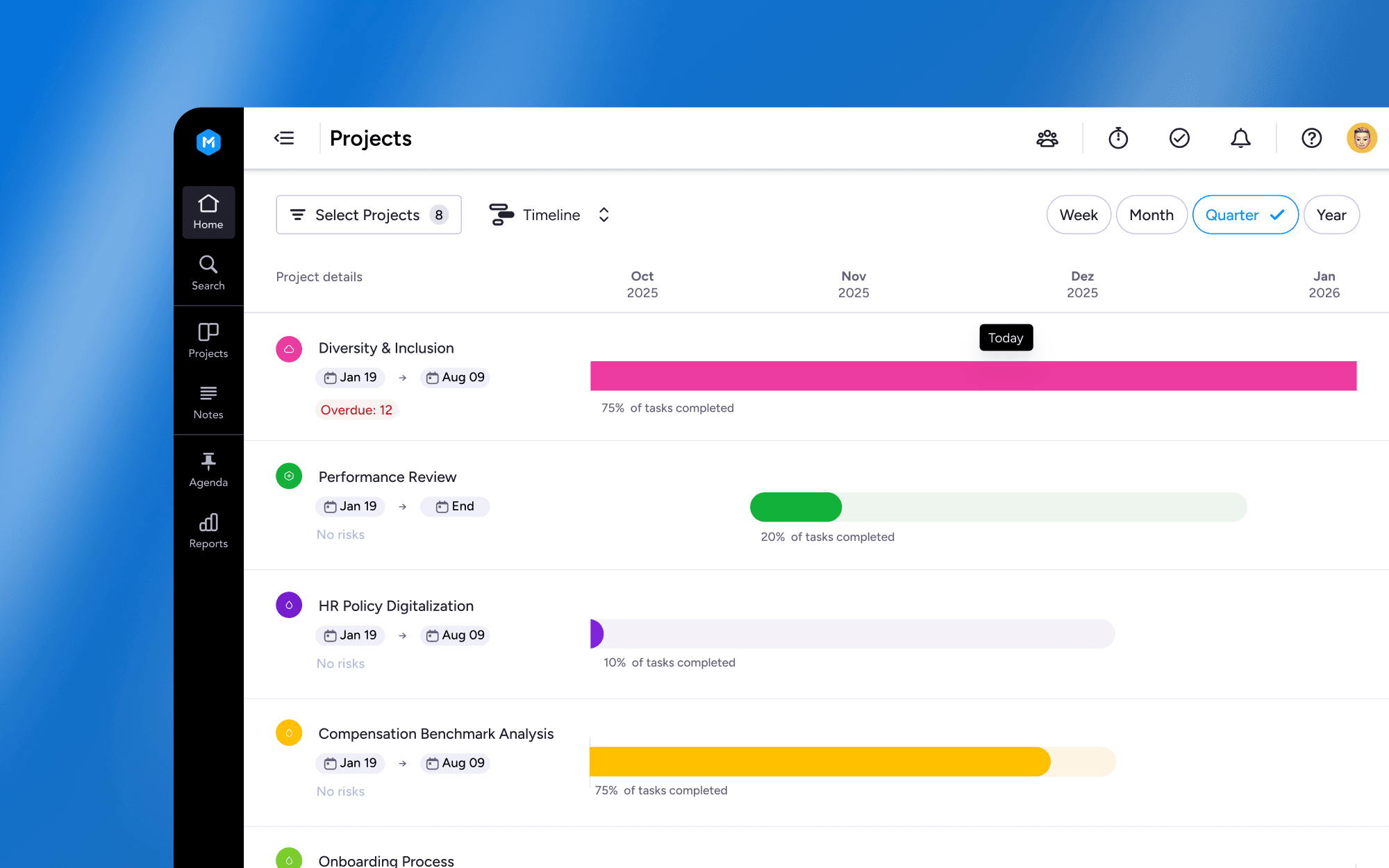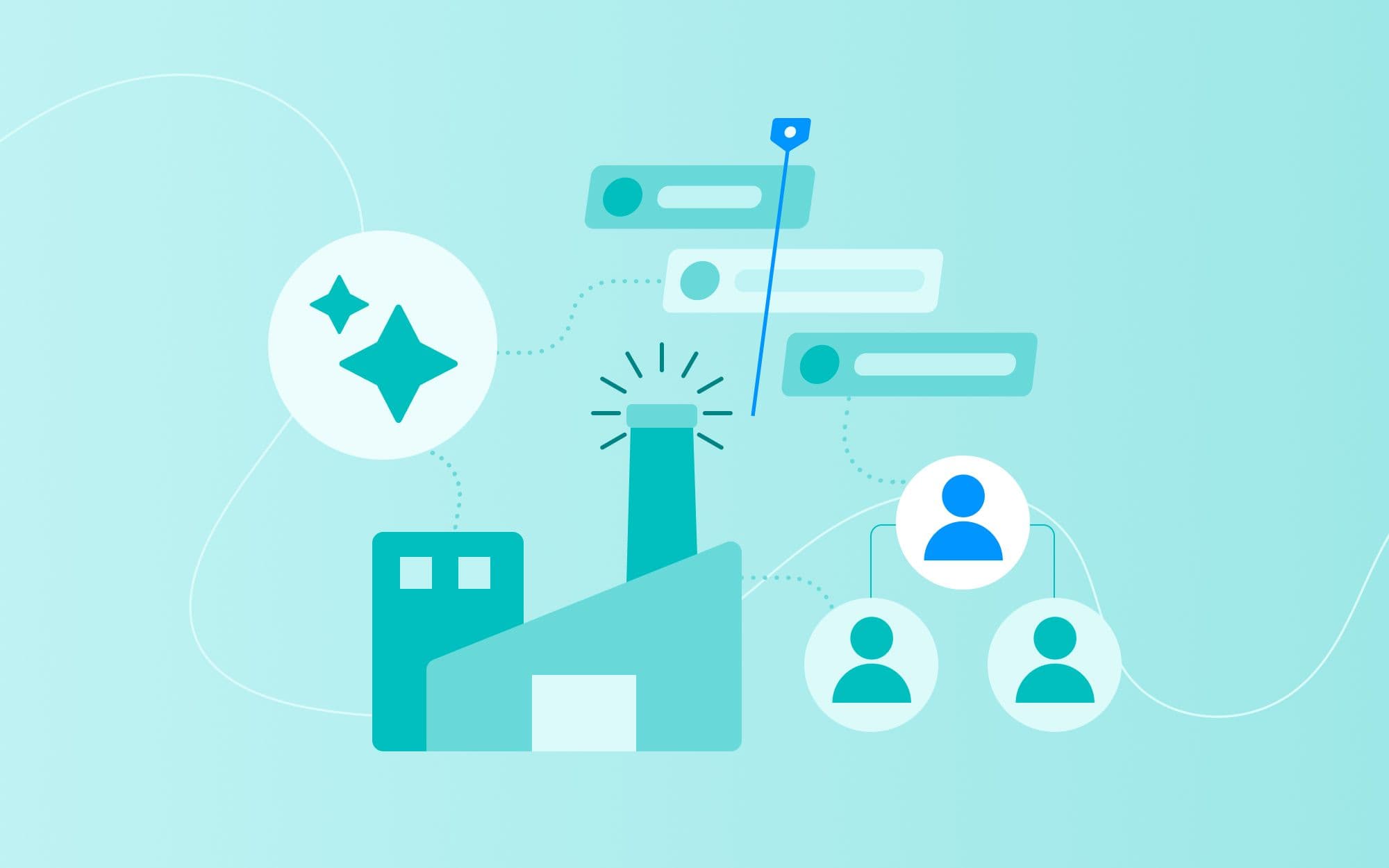What is a digital mindset?
Digitalization isn’t just about tools — it changes how we think and work. A digital mindset helps you navigate this shift with confidence. It’s a critical foundation for effective change management. But what makes a team or individual not just accept change, but drive it?
At its core, a digital mindset is defined by four traits:
Openness to change: Instead of clinging to “the way we’ve always done it,” digitally minded organizations ask: “how can we do this better?”. Even in traditional sectors like public services or manufacturing, they find opportunities to improve, whether that’s through automation or smarter workflows.
Willingness to learn: People with a digital mindset see change as a chance to learn. They stay curious, challenge old habits and constantly explore new solutions to improve how they work. A workplace culture that’s open to learning makes it easier to experiment and share knowledge across teams.
Ownership and initiative: Digital transformation thrives when people take initiative. Those who step up don’t wait for someone else to lead — they start the conversation, push for solutions and bring others along. They don’t just experience change, they help shape it.
Leadership: Leaders set the tone for mindset shifts within their organization. During transformation, their role goes far beyond decision-making — they become ambassadors and role models. Teams are more likely to embrace new ways of working when leaders model the behavior, remove barriers and build trust.

Why is a digital mindset so important?
You’ve rolled out new tools. Your IT team invested in modern software. Processes are becoming more digital — but somehow, the big breakthrough never comes. Adoption is slow, the team is hesitant and the impact is limited.
That’s not unusual. Research repeatedly shows that culture — not technology — is the key to successful transformation. Without a digital mindset, digital transformation becomes a box-ticking exercise. Teams may follow new processes on paper but ignore or bypass systems in practice. As a result, your transformation stalls, ROI falls short and your competitive edge fades. Start change management with a focus on culture — and you'll lay the groundwork for real transformation.
What stands in the way of a mindset shift?
Change is rarely easy. Even with clear benefits, cultural shifts don’t happen overnight. MeisterTask’s survey of cities and municipalities in Germany shows that 97% see digitalization as essential — yet only about one-third rate their current progress as satisfactory. More often than not, the blockers are human, not technical. The good news? Once you know what’s holding you back, you can address it head-on. Here are some common blockers:
Fear of losing control: Going digital often means handing over or changing the way tasks are managed. For many, that feels like losing control. In public services, for example, switching to an online application system might remove the need to check every step manually. Even if the system reduces routine work, people may worry they’ll miss something or lose oversight.
Siloed thinking: Many departments still work in isolation — with separate tools, goals and data. This disconnect hinders collaboration and blocks agile thinking. For example, if production planning uses software that doesn’t integrate with logistics or sales, decisions are based on incomplete information. Even the best tools can’t fix that.
Fear of failure: In many organizations, mistakes still carry a stigma. This is especially true in highly regulated sectors. Teams are reluctant to try new approaches – because taking risks often means stepping outside of comfort zones.
Resistance and frustration: Not everyone is eager to adopt new technologies. Some find digital tools tedious or overwhelming. Others don’t see the value or weren’t involved in the decision. That lack of buy-in makes meaningful adoption almost impossible.

How do you build a digital mindset?
A digital mindset doesn’t just appear overnight — and certainly not at the push of a button. It’s like changing your diet for long-term health: it takes intention, small steps and a willingness to let go of old habits, little by little.
Here are five ways to support that shift in your team:
1. Reframe mistakes as learning opportunities
Agile thinking needs space to experiment — and that includes the psychological side of change management. When your team knows that mistakes aren’t career-ending but growth-promoting, they’ll be more willing to try new approaches. A healthy error and learning culture reduces fear and unlocks innovation.
2. Lead by example
Leaders are cultural catalysts. Being open to new tools, embracing change and communicating clearly — that’s what sets the tone. Change starts at the top. Whether you're a CEO or a team lead, your openness signals that learning and growth aren’t optional, they’re part of your organization's DNA.
3. Enable ownership
People are more likely to support what they help create. Imagine a public office introducing a new online appointment system: instead of letting external consultants run the show, invite your team to actively step up and help. Let them organize workshops, run tests, give feedback and refine the process. Co-creation turns skepticism into ownership — and acceptance levels rise.
4. Focus on soft skills
Tech skills matter. But the real key to a digital mindset often lies in soft skills. Collaboration, solution-focused thinking, the ability to give and receive feedback and empathy are the skills that make modern, connected teamwork possible. Help your team build these capabilities through initiatives like:
Regular feedback
Shared reviews and retrospectives
Coaching and training sessions
That’s how you build a culture where teams grow together.
5. Integrate tools meaningfully
Digitalization isn’t only about tools, but they’re still essential. You need the right tech to turn new ways of working into daily practice. According to our data report, 83% of German municipalities see digital tools as key to reducing workload. But tools only work if used intentionally. They’re not valuable until you use them deliberately. And that’s exactly where many organizations and public institutions struggle. In fact, around two-thirds of the mayors we surveyed say they find it difficult to integrate new tools into their existing systems.
Follow the introduction of tools proactively:
Communicate clearly how the tool will improve everyday work
Offer personalized support for different levels of tech comfort
Encourage creative, use-case-driven experimentation
Support this process with our change management template from MeisterTask to structure tasks, clearly define responsibilities when introducing the tool and make communication transparent for everyone.
Properly integrated, digital tools will solve typical challenges in your everyday work.
Modern collaboration: Information is scattered, coordination is time-consuming and manual work ties up valuable resources. Sounds familiar? Digital tools like MeisterTask break down these barriers by streamlining task management and enabling transparent, agile collaboration.
Automated admin: Digital tools cut out the busywork. They automate tasks, set reminders and streamline processes – reducing errors and freeing up time for creative, strategic work.
Better work-life balance: Digitalization can create a healthier workplace. When teams are aligned, responsibilities are clear and deadlines visible, stress drops. Tools such as MeisterTask help you build calm, organized workflows that support balance and efficiency.
The true value of a tool reveals itself in everyday use. Teams with a digital mindset don’t just use MeisterTask for to-do lists — they explore and shape new, better ways of working. They optimize workflows, experiment with automations and make collaboration transparent. It’s this openness that transforms MeisterTask into a central platform for cross-team, agile work.
Digitalization starts in the mind — and grows with culture
Digital tools without a digital mindset are like an electric car with a dead battery: the tech is there, but the power is missing. The energy comes from your culture — from people who see change as an opportunity and want to be part of it.
That shift doesn’t happen overnight. But it’s worth the effort. With MeisterTask, you’re not just investing in tools, you’re investing in transparency, agility and a people-first way of working. Book your free demo and experience how easy digital collaboration can be with MeisterTask.



